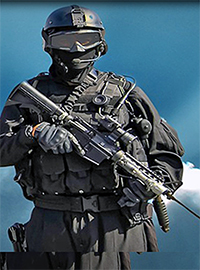| Gallup Poll: Americans Still Value Police and Military Highest |
 |
|
By Timothy H. Lee
Thursday, July 14 2016 |
Events this summer make each day seem worse than the preceding one, creating an alarming sense of national disintegration while defining deviancy downward a little bit more. Exacerbating matters, it seems we often collectively undervalue those whom we should value most: military and police personnel who every day risk their very lives on our behalf. Sadly, that state of affairs starts at the very top. If any doubt remains, try the following mental exercise. Watch video footage of Barack Obama addressing the nation after the cold-blooded murder of five police officers in Dallas, noting the disturbingly dry, dispassionate, distant tone with which he speaks. Then, compare that to the brimming passion, agitation and earnestness with which Obama speaks when referencing political opponents, firearms rights, or free markets. Fortunately, as is often the case, Obama's own apparent priorities don't parallel the American public's. That's the primary takeaway of the latest annual Gallup survey on Americans' confidence in fourteen national institutions. Every year since 1993, Gallup has asked the public how much confidence it maintains "in the institutions that affect their daily lives." The fourteen institutions include (1) the military, (2) police, (3) church or organized religion, (4) our medical system, (5) the presidency, (6) the U.S. Supreme Court, (7) public schools, (8) banks, (9) organized labor, (10) the criminal justice system, (11) television news, (12) newspapers, (13) big business and (14) Congress. Overall, Americans' opinions this year were so depressed that Gallup led with the headline "Americans' Confidence in Institutions Stays Low": Americans' confidence in the nation's major institutions continues to lag below historical averages, with two institutions - newspapers and organized religion - dropping to record lows this year. The overall average of Americans expressing 'a great deal' or 'quite a lot' of confidence in 14 institutions is below 33% for the third straight year... Americans clearly lack confidence in the institutions that affect their daily lives: the schools responsible for educating the nation's children; the houses of worship that are expected to provide spiritual guidance; the banks that are supposed to protect Americans' earnings; the U.S. Congress elected to represent the nation's interests; and the news media that claims it exists to keep them informed. Amid that broader negativity, however, lies a pleasant surprise. Of the fourteen measured institutions, only two achieved ratings of "a great deal" or "quite a lot" of confidence: the military and our police. The military retained its astoundingly high 73% high confidence rating that it had ten years ago at the height of the Iraq and Afghan wars. Police ranked second with a 56% high confidence rate, essentially matching its rating of ten years ago. The next-highest rated institution, organized religion, came in with a 41% rating of high confidence, and our medical system was just behind in fourth at 39%. Accordingly, while one might get the misimpression that our military and police personnel have become undervalued in recent years and following recent events, the opposite is true. By a significant disparity, both groups remain highest in Americans' esteem. Another takeaway from the survey merits highlight. Namely, the mainstream media endlessly reminds us how negatively Americans view Congress, our medical system and the criminal justice system. But the media hardly has room to criticize, with only 20% reporting high confidence in newspapers, and just 21% toward television news. Regardless, the Gallup survey offers reason for optimism. As we enter the post-convention presidential election season, it also helps to illustrate that government works best and remains most popular when it comes to its core functions: safeguarding national and domestic security. That instructive fact is something our elected leaders and American voters should bear in mind as government continues to expand and seek novel ways of micromanaging our lives. |
Related Articles : |
























